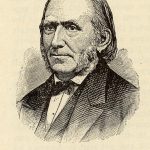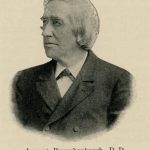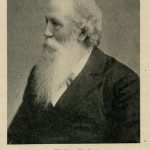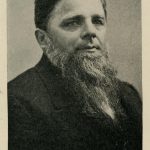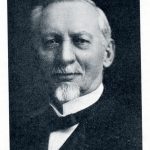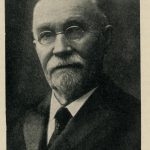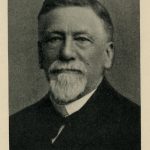Earliest North American Baptist Conference Leaders
These short sketches are derived from an article written in the April 15, 1926, edition of The Baptist Herald, written by Albert Ramaker. The earliest leaders in this list include only the first generation men, the “fathers,” as Albert Ramaker affectionately called them. This includes the 50-year period of 1843–1883 when the General Missionary Society was founded. These biographies of selected men are in chronological order as much as possible.
Konrad Anton Fleischmann (1812–1867)
Born in Nürnberg, Bavaria, Germany, he converted at 19 among Dissenters in Switzerland, was baptized by immersion later, received theological training at Bern, pastored at Emmental, came to America in 1839, and began missionary work in Newark, New Jersey, with some success. He found more fruitful field in Lycoming County, Pennsylvania, where extensive revivals brought hundreds of German people to Christ. In 1842, he centered his labors in Philadelphia, Pennsylvania, where he founded the first German Baptist church in the United States on July 9, 1843; he remained its pastor until his death. He was a man of varied gifts – preacher, pastor, organizer, hymn-writer, and first editor of Der Sendbote.
August Rauschenbusch (1816–1899)
Born in Altena, Westphalia, Germany, he received a mostly liberal education at several German universities, succeeded his father as pastor of the German State Church in the city of his birth, came to America in 1846, and settled with other German immigrants in Missouri, where he became an itinerant preacher. About 1849, he entered the services of the American Tract Society as superintendent of German colporters and became the editor of its German monthly; he joined the Baptists in 1850 and baptized the first Germans in Ontario in 1851, and he was called to Rochester Seminary in 1858 as the first professor of the German department, where he remained until 1890. No one man exerted a larger influence on the life of our churches than he did through his classroom, preaching, newspaper writing, and books.
Philip Bickel (1829–1914)
Born in Wentheim, Bavaria, Germany, he came to America in 1848; liberally educated in Germany, he found employment in journalism and printing. About 1850, he came under the influence of gospel preaching, was converted and joined a Baptist church in Waukegan, Illinois. He entered Rochester Seminary in 1852—one of the first five German students to enter there—graduating in 1855. He began missionary work in Cincinnati, Ohio, and founded a German church in 1857; he was elected editor of Der Sendbote in 1865 and returned to Germany in 1878 to take charge of Wahrheitszeuge, a position he held for 35 years. He was a newspaper writer of rare ability, a poet, a hymn-writer, and an enthusiastic Sunday School man.
Julius C. Haselhuhn (1829–1893)
Born in Altenburg, Saxony, Germany, he came to America in 1849, where he was converted and baptized into the fellowship of the German church (First) in New York City. He entered Rochester Seminary in 1852—one of the first five German students—graduating in 1858; he held pastorates in Wilmington, Delaware; Newark, New Jersey; St. Louis, Missouri; and Chicago, Illinois (First Church); he succeeded Philip Bickel as editor of Der Sendbote in 1878, a position he remained in until his death. He was a preacher of great forcefulness, a writer of recognized ability, and a man of marvelous capacity for hard work.
Jacob Samuel Gubelmann (1836–1919)
Born in Bern, Switzerland, he came to America at the age of 12, converted and was baptized in New York City, and entered Rochester Seminary in 1852—one of the first five German students—graduating in 1860. For twenty-five consecutive years he served as a pastor of various churches in Louisville, Kentucky; St. Louis, Missouri; and Philadelphia, Pennsylvania (First Church), when, in 1885, he was called to Rochester Seminary as a teacher, a position he held for thirty years. He was a man of liberal learning and unquestioned reverent piety, a model preacher, and a most lovable Christian gentleman.
George A. Schulte (1838–1916)
Born in Neustadt-Goedens, Hannover, he came to America when he was 12 years of age, settling with the rest of the family in Buffalo, New York, where he was converted and baptized. He entered Rochester Seminary in 1860, graduating in 1863. He held pastorates in Buffalo (Second Church, now extinct) and New York City (First Church), New York, where he remained for twenty-one consecutive years. He was chosen as the superintendent of German Missions under the American Baptist Home Mission Society, a position he held for twenty-four years. An able and inspiring minister, a devoted pastor, and an organizer of rare tact and ability, he did more than any other man to unify the missionary work of the German churches.
Julius Carl Grimmell (1847–1922)
Born in Marburg, Germany, he came to America with his parents in 1852. At age 14 he became a member of the First German Church in Brooklyn, New York, which his father, a lay preacher, had been instrumental in founding. He entered into Rochester Seminary in 1863 and graduated in 1868; he pastored in Buffalo, New York (First), which he left in 1873 for the church of his spiritual birth, to which he ministered with one interruption for thirty-five years. He was editor of Der Sendbote for nine years. His outstanding gift was that of pulpit eloquence.
Hermann Moritz Schaeffer (1839–1910)
Born in Lage, Lippe-Detmoldl, Germany, he came to America in 1854 and joined the Union Baptist Church in Boston, Massachusetts, by baptism. After studying at Rochester Seminary from 1861 to 1867, he became the pastor of the First Church, New York City. He was later called to Rochester Seminary as a professor in 1874, a position he held until his death. He was a man of tremendous energy and untiring devotion. It was largely through his efforts that the German Department at Rochester came into possession of its dormitory and its endowment.
Peter Ritter (1837–1920)
Born in Algenau, Bavaria, he immigrated to the United States in 1857. He was converted in early manhood in western New York and joined the Baptist church in Attica. Entering the Rochester Seminary in 1864, he graduated three years later. His ministerial services cover a period of forty-eight years, thirty-six of which were spent in active ministry and the rest as head of the business department of the Publication House at Cleveland, Ohio. He held pastorates in Folsomdale, New York; Cincinnati, Ohio; and Rochester, New York. He was a great winner of souls and one of the most successful of our early ministers.
Jacob Meier (1839–1921)
He was born in Oberschaffhausen, Bavaria. After a short course of study in Rochester, New York, he became pastor at Muscatine, Iowa, in 1873, when he was called to First Church in Chicago, Illinois, in 1878 as the successor of J. C. Haselhuhn. He spent 43 years of a most fruitful and successful service as preacher, pastor, and organizer of Christian philanthropies. The Old Peoples Home, the Deaconess Home, and the Benevolent Society of the Chicago German Churches are monuments of his untiring zeal and his masterful gift of organization, as is the upbuilding of a strong, vigorous church, into the fellowship of which he had baptized upwards of 1,200 persons.
Johann Heinrich Moehlmann (1845–1919)
Born in Aarsdorf, Hannover, as a son of a Lutheran minister, he had the advantages of an early liberal training; coming to New York City in 1864, he was baptized by Johann Eschmann, joining the First Church in New York Church. He studied at Rochester 1865–66 and 1872–73 and held pastorates in Meriden, Connecticut; Racine, Wisconsin; and Detroit, Michigan. He was at First Church in Detroit for eighteen consecutive years. He was a most accomplished preacher, and the great expansion of the German work in Detroit was in great measure due to his devotion to such work.
Walter Rauschenbusch (1861–1918)
Born in Rochester, New York, the son of the seminary’s first teacher, he converted in early life and joined the Rochester church. After a most liberal education in Germany and at Rochester, he finished his theological training in 1886 and became pastor of the Second German Church in New York City. He was called to the seminary as a professor in 1897, at the death of Professor Schaeffer; he joined the English faculty in 1902, where he served as teacher of Church History until his death. He served as pastor, editor, teacher, hymn-writer, and author over a period of thirty-two years, but into these years there was crowded much more than an average man’s accomplishments of fifty years. He was one of the most gifted men of his day.
